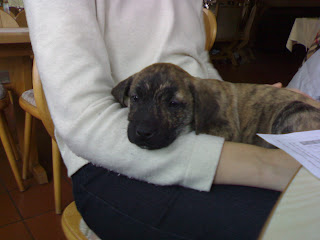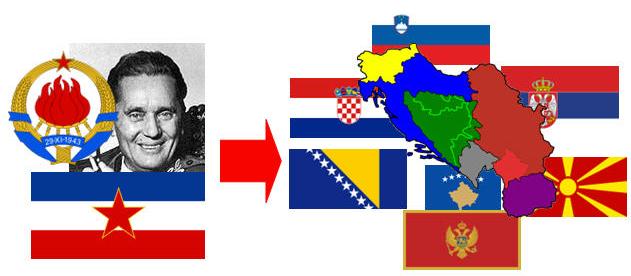 Monica (or Monitsa or just Moni) really does understand Serbian. And I don't mean Serbocroatian or Serbian/Croatian or Serbian/ Croatian/ Bosnian/ Montenegrin or Naški or anything else neutral, I mean proper Serbian dialect. A recent Croatian visitor - indeed a linguist - who visited us recently here in Germany was shocked, and even mildly impressed, to hear my correct and distinctly Serbian (even Novi Sad) vowels when I would say sedi (and not sijedi or sidi or some such) - for sit down, lezi - for lie down, dodji (come here), dole/gore (down/up) and ne about eight hundred times per day. I have also learned several kiddie, giggle-inducing verbs that one never learns in books, such as kakiti (kakati in Croatian I discovered) and piškiti for the things that Moni likes to do mostly outside, but occassionally on G's precious Turkish carpets or in my shoes. Gristi describes what she does with her teeth to my feet when I'm taking my shoes off causing me to yelp, and when she's misbehaves, we call her glupi psu - crazy dog.
Monica (or Monitsa or just Moni) really does understand Serbian. And I don't mean Serbocroatian or Serbian/Croatian or Serbian/ Croatian/ Bosnian/ Montenegrin or Naški or anything else neutral, I mean proper Serbian dialect. A recent Croatian visitor - indeed a linguist - who visited us recently here in Germany was shocked, and even mildly impressed, to hear my correct and distinctly Serbian (even Novi Sad) vowels when I would say sedi (and not sijedi or sidi or some such) - for sit down, lezi - for lie down, dodji (come here), dole/gore (down/up) and ne about eight hundred times per day. I have also learned several kiddie, giggle-inducing verbs that one never learns in books, such as kakiti (kakati in Croatian I discovered) and piškiti for the things that Moni likes to do mostly outside, but occassionally on G's precious Turkish carpets or in my shoes. Gristi describes what she does with her teeth to my feet when I'm taking my shoes off causing me to yelp, and when she's misbehaves, we call her glupi psu - crazy dog.What is most convenient, however, is that G. speaks Serbian to the dog as well, which makes a nice change. I'm been trying for years to get her to speak Serbian to me, but it takes a certain patience to speak Serbian to a learner, especially one pushing 40, so after a few frustrating sentences she usually gives up and switches to English. However, even the most impatient people have more time when speaking to somebody who is furry and 12 weeks old. And it seems that most everybody wants to speak their native language with small animals. So Moni and I, we learn Dog Serbian together.
The fact that other people (i.e. in Germany) don't understand isn't a problem. Indeed, I'm glad to have somebody else who speaks this handy-dandy language that G and I sometimes use to speak to each other when we want to discuss somebody's weight, smell, clothes etc. And if Moni understands sedi when I say kaki most people will be impressed that such a young dog does what she's told.
I wonder: does her little puppy brain deal with case? Is it Monitsa or Monitse? Or does it matter, since when do you ever use anything but the vocative with a dog? And while we are on the subject of Serbian confusion, we bought her a house yesterday, i.e. a kuća, and she is a puppy (or cub), so kuče, making her house - that is the puppy's house is kučetova kuća. The houses house? The houses dog? And yes, I know, I'm a dunce for making a song and dance about it, but my "ch" sounds are primitive, so my ability to hear the difference between č and ć is about as easy as differentiating the English names Dan and Den for a Serbian native speaker, meaning that I don't know whether it is the dogs house or the houses dog. Probably doesn't matter to her.
Which reminds me of a Serbian book, that I tried to read: Kuća Mrtvih Mirisa. So lots of genders, lots of cases in there, I can see that, I'm not that stupid: all those endings and what not - I read about all that malarky somewhere. But the problem is I don't know if it means the dead smelly house, the smell of dead houses, or the house of dead smells, or even the house that smells dead. Blimey, I think Moni and I will need to attend an intensive course, or perhaps I should just stick to Dog speak. Braaaavo, Dooooobra.
